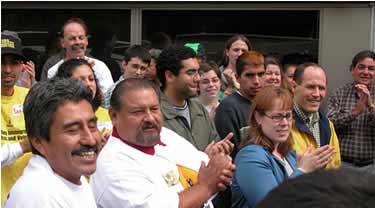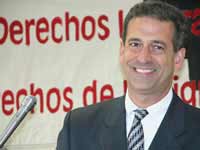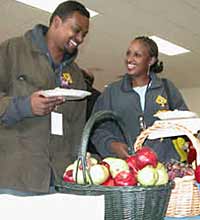
|
|||||||||||
|
News and Photos from the Minneapolis/St. Paul Bus Read about Madison, Milwaukee, Brookfield, and the Bus Ride. by Michael Kuchta
9/28-MADISON, Wis. - U.S. Sen. Russ Feingold of Wisconsin told Freedom Riders Sunday that American immigration policies must be rewritten. In a brief speech at the Madison Labor Temple, where riders stopped for lunch, Feingold said: “We must respect the laws of this country, but some laws must be changed.” Standing in front of a banner that stated “Labor Rights, Immigrant Rights, The Same Struggle,” Feingold singled out laws that keep families apart, limit the ability of even the best immigrant students to attend college, and give immigrant workers even fewer rights on the job than American workers get.
Feingold picked up a theme introduced by rider Jorge Flores, of Centro Derechos de Laborales at the Resource Center of the Americas. “If the law has turned into a way to break up families, then we need to change it,” Flores said. “If we are breaking up families, then we are violating a basic human right.” Jaye Rykunyk, president of Hotel and Restaurant Employees Local 17, said: “If America is the home of the brave, then it is also the land of the free. That is the promise these brave riders are going to Washington to demand…. This ride is for the promise of America.”
Although running behind schedule, as they had all day, riders did stop briefly in nearby Jefferson, where they joined a rally in support of UFCW workers who have been on strike for seven months against Tyson Foods. 9/28-MILWAUKEE - A fiery speech by the Rev. James Lawson and a rousing welcome at Our Lady of Guadalupe Church capped Day One of the Minnesota leg of the Immigrant Workers Freedom Ride with an exclamation point. Riders arrived at the South Side Milwaukee church just as Lawson -- an original leader from the civil rights movement in the 1960s -- was concluding a blistering statement challenging the priorities of those in power in Washington. “The Freedom Ride is a sign that it’s time for the people to rise up and again become a force for freedom,” Lawson said. Riders - as they had earlier in the day - then heard painful stories that reinforced why the ride is necessary. Mariana Lezama, of the church coalition MICAH, gave a glimpse of the hardship her family faces since her husband was deported three years ago. He had legal residency status until 1996 changes in immigration law forced his deportation, she said. “I live in Milwaukee without my husband,” Lezama said. “Our two sons live in Milwaukee without their father…. “Immigration laws are anti-family,” she declared, “and laws that are anti-family are anti-American.” Her testimony, like many others’, was interrupted by clapping, foot-stomping and raucous chants of “Si, se puede” and “Yes, we can!” Juan Evangelista, who is now working with the Laborers Union, told of contractors who routinely take advantage of immigrant workers, forcing them to remove asbestos without proper training, without proper safety equipment, without proper procedures and without proper cleanup. Jaime Gonzalez, also of MICAH, urged workers to get angry about the way they are treated. “They ignore our rights, they ignore our safety, they pay us less,” Gonzalez said. “We can work here, but we can’t raise our families here.”
9/29 BROOKFIELD, Wis. - Freedom Riders interrupted the calm of a tree-lined suburban office park Monday morning for a blitz of the office of Congressman James Sensenbrenner. Riders and immigrant rights advocates in Milwaukee are targeting Sensenbrenner because, as chairman of the House Judiciary Committee, he controls the fate of legislation that would make it possible for immigrant students living in the United States to attend American colleges. Advocates would like Sensenbrenner to co-sponsor the legislation or, at the very least, quit being an obstacle and allow a hearing and action on the bill (HR 1684). “At this point, he won’t sponsor it or schedule it,” said Christine Neumann-Ortiz, of the Milwaukee advocacy group Voces de la Frontera. “He killed it last year by not calling for a vote.” As riders and other crowded into Sensenbrenner’s office and the hallway outside, Neumann-Ortiz explained what advocates want Sensenbrenner to do. They refused to let chief of staff Tom Schreibel avoid scheduling Sensenbrenner for a meeting to discuss the legislation. The House legislation is called the Student Adjustment Act. Its Senate companion (S. 1545) is the more widely publicized Dream Act. Both bills would address obstacles facing an estimated 50,000 high school graduates each year. Even though they have lived in the United States for more than five years, it is almost impossible for them to continue their education or obtain work permits because they originally were brought to the U.S. by parents lacking legal documentation. The legislation would allow states
to determine their own definition of “resident” students
and allow students who meet certain criteria to apply for legal
residency.
Monday - if we make it through Chicago
traffic - it’s on to Indianapolis and Columbus. But we’re all learning quickly - besides “Si, se puede,” many can now say “Yes, we can” in Swahili, Oromo and Somali, too. Altogether, it turns out, riders speak at least 14 languages - not counting, as rider Marv Davidov puts it, those who speak sense and nonsense. The riders come from 14 countries beside the U.S., from at least 8 unions, and from nearly a dozen community and religious groups. Education is a big part of the trip. Sunday, we got a quick introduction to some of the reasons our fellow riders came to the U.S. - fleeing civil war, poverty, genocide or religious persecution; reuniting with family members; or seeking a job, education or freedom. We learned some of the differences of what it means to be classified an immigrant, a refugee or an asylee. We began to hear first-person stories of the toll that living as immigrants takes on families and individuals. We saw and discussed a video about the fast-growing immigrant population in Houston, and how unions, immigrant workers and activists from the Hispanic, African-American and other ethnic communities are working together to minimize competition, tension and misunderstandings. They’re also finding ways to fight problems such as exploitation of day laborers. Serious stuff, all of it, broken up - at least on the People bus - by occasional comic relief from Davidov or Lu Samaniego, a rider from Hotel and Restaurant Employees Local 21 in Rochester. Minnesota riders left from the Neighborhood House on St. Paul’s West Side about 8 a.m. Sunday. The Rev. Doug Mork, of the Twin Cities Religion and Labor Network, was among clergy and others offering prayers before the buses left. Mork prayed not only for safety, but also “for a new order in which people are not oppressed, in which immigrants are seen as brothers and sisters, in which people may know their common humanity.”
You can read more about the Minneapolis/St. Paul bus at Workday Minnesota. Michael Kuchta is editor of The
Union Advocate newspaper in St. Paul. He will report daily from
the Minnesota route of the Immigrant Workers Freedom Ride. _________________________________________________________
© 2003 Hotel Employees and Restaurant Employees International Union |


